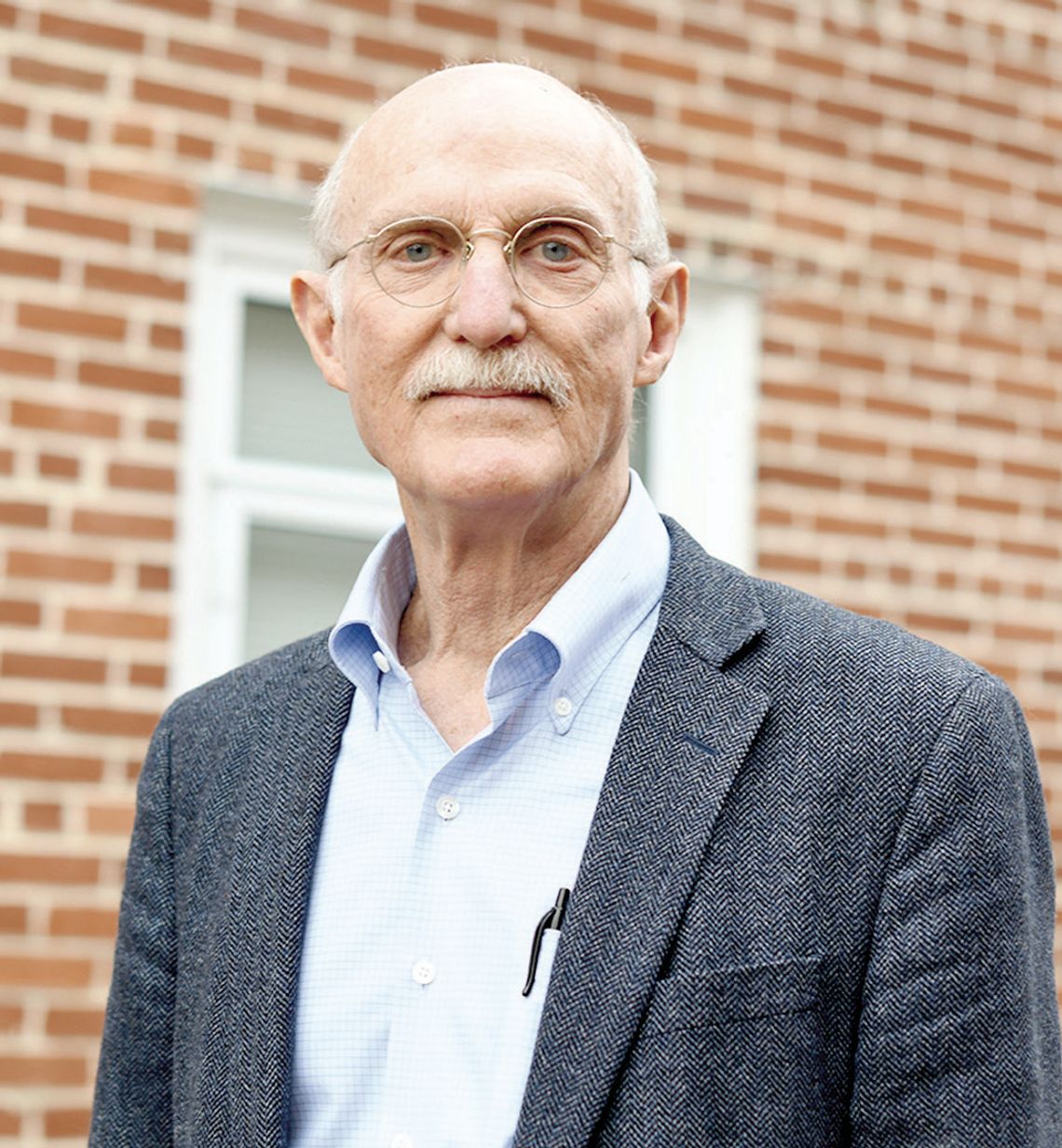Editor’s note: the following story was written by Marianne L. Hause, media relations specialist, VMI Communications & Marketing.
After 31 years of treating members of the corps of cadets at Virginia Military Institute, Dr. David Copeland is retiring in May from his position of institute physician.
Copeland grew up in the small rural town of Carthage, Texas, surrounded by extended family. “It was an idyllic childhood. My two brothers and I spent a lot of time outdoors. We were taught to garden and work with livestock. Both my parents, as well as my aunt, were teachers at the school we attended, so I had them all as teachers,” he reminisced.
Copeland attended Stephen F. Austin State University in Nacogdoches, Texas, where he earned a bachelor’s degree in English, then went to the University of Memphis in Tennessee and earned a master’s degree. He then volunteered in the Peace Corps. With his farming background, he requested to work on an agricultural project, which placed him in Benin, a Frenchspeaking West African nation for two and a half years.
Living among the people of Benin gave him a different perspective on the world, he said. “I taught the people to use oxen to pull plows instead of using handheld shovels to turn the soil to sow seeds. The average annual income at that time in that part of the country was about $50. By using oxen, it enabled the people to make a little more money.
“It was a very basic way of life, which I found very appealing, rid of all the excesses of the Western world. There were no throwaway people there, everyone was cared for. I remember a middle-aged man whose legs were paralyzed, and every day his family would carry him out to the field, where he would get down on the ground and work the crops with a hand shovel. He contributed to the community, and was a valued member. There was no medical care, just a small clinic run by a retired man who had served in the French army. The only drug at his disposal was aspirin.”
Upon returning to the United States, through a mutual friend he met a young lady, Irene Townsend, who was attending medical school, and who would later become his wife. “She was in her last year of medical school when we were introduced by my closest friend in the Peace Corps, who turned out to be her closest friend in middle school when she was growing up,” recalled Copeland.
Unsure of his next direction in life, Copeland’s brother urged him to attend veterinary school because of his love for animals. “So, I actually started taking pre-vet classes, which fortunately are the same core classes as pre-med. I was spending so much time hanging around the hospital when my wife and I were courting, that it was a natural transition for me to switch to medical school,” he mused. Copeland received his medical degree from Case Western Reserve University in Cleveland, Ohio, and served both his internship and residency at Beth Israel Hospital, now called the Beth Israel Deaconess Medical Center in Boston, Massachusetts. He worked in internal medicine at an HMO in Boston for two years after completing his training.
Copeland and his family moved to Lexington for several reasons: the close proximity to his older brother who lived in Washington, D.C., the opportunity to live in a rural area, and the temperate climate. He worked as an internal medicine physician in Lexington for seven years. “It turns out I was a terrible businessman, and they don’t teach you how to run a business in medical school. I was actually struggling because I would treat patients who didn’t have any money, and I wouldn’t charge them. I worked long hours. If it snowed and patients didn’t show up, I didn’t have any income, but I still had to pay my staff, and that is disheartening.”
Copeland got to know Dr. William W. Old III, the previous VMI physician, since Old often referred patients to him. So, when he heard Old was retiring, he applied for the position. “I liked the fact that this was a salaried position with retirement benefits. It gave me a fixed schedule, so I had more time for my family. I had two young children at the time, so that was very important to me. I felt welcomed at VMI right away, and the cadets referred to me as ‘Dr. New,’ since I replaced Dr. Old,” he quipped.
Having no personal military experience nor any familial military connections, Copeland was initially anxious about adapting to the culture at VMI, but over time has learned a lot about the VMI culture, and appreciates the directness, honesty and goodwill he finds on post. “The Honor Code rubs off on everyone who works here, and it makes you very conscious of the importance of being rigorously honest,” he said.
Under Copeland’s tenure, the infirmary has grown with more services offered. “When I first started, we had four full-time nurses and one administrative person. Over time, we have increased our services, and I think we’re doing a better job. We now have three full-time administrators and eight full-time nurses covering round-the-clock shifts. First thing on Monday mornings, we used to have 50 to 60 cadets show up waiting to be seen. Now, we encourage appointments, and have an average wait time of less than five minutes. We know how busy the cadets are, so we strive to get them seen, and back to their duties as quickly as possible,” Copeland explained.
The addition of family nurse practitioner Jenny H. Crance in 2011 also helped Copeland with his practice. “Not only does she share the load of patient care, but it is so helpful to be able to discuss ideas with her, and to get second assessments from her. Her presence here has made a big difference,” said Copeland.
The VMI infirmary has 18 beds, but is not a hospital. “The usual maladies we treat here, are things like stomach viruses. Normally a college student with that type of illness would go back to the dorm room to recuperate, but for a cadet, it’s hard to be sick in barracks. Allowing cadets to stay here until they recover is more of a convenience for them, and it also helps to protect their roommates from catching the virus. The nurses assess cadets and have me or Jenny Crance see patients they are concerned about. The nurses make sure the patients are getting their fluids and medications. If cadets are more seriously ill, or if they need an X-ray or IV fluids, they are referred to the hospital in Lexington,” said Copeland.
According to Copeland, COVID-19 first hit VMI the same time it did at schools all over the country. “We were very busy, but the staff here pulled together and got the job done. Jenny Crance was instrumental in restructuring the efficiency of the office. Caitlin Perry, the head nurse, worked out how to swiftly communicate with the commandant’s staff, primarily Sgt. Major Suzanne Rubenstein, in isolating COVID-19 positive cadets and providing them proper medical care. Alerting and quarantining close contacts added to the workload.
“We were following CDC guidelines about how to quarantine and isolate, and it was almost overwhelming,” he said. “But the staff maintained calm and developed a protocol on the fly, which became very useful as overwhelming. But the staff maintained calm, and developed a protocol on the fly, which became very useful as we all came back in the fall of 2021. It was a great exercise on how to deal with a slow moving emergency.”
Copeland admits that his decision to retire was not an easy one. “I love coming to work, and working with the infirmary staff. I’ve known my office manager, Lorie Kingery, since 1985, when she was a student in high school, and she’s been with me off and on since then. I’ve known Jenny Crance since she was 15 and a friend of my daughter. Most of my nurses have children, so for me it’s like those children are all my grandchildren. I’ll miss them,” he lamented.
He and Irene built a house on 30 acres, and his plans include working on the property and enhancing his vegetable garden. He also plans to cultivate his hobby of shaping stone into artwork. Two of his stone works, a human face and a small statue of Biblical patriarch Abraham and wife Sarah are carved out of pink alabaster and on display in his office. “I like the feel of shaping stones and polishing them. It’s a mental challenge, which I enjoy. It’s very tactile,” he explained.
Copeland and Irene, who still practices pediatrics in Roanoke and Staunton, plan to travel. “My goal is Greece. I’m a great fan of ancient Greece. I want to see some old ruins, and the Parthenon, and the country has great weather and great food.” The couple have two children who they would like to visit more often: a daughter, Lillian, in New York who is a professional oboist and often plays with the Metropolitan Opera and the American Ballet Theatre; and a son, William, in San Francisco, who is a professional swimmer and came close to qualifying for the U.S. Olympic team. He now owns and operates a pool and teaches swim lessons.
Copeland’s successor will arrive on post in March, allowing the two to work together in April, and then Copeland will retire in May. “I am confident the new physician will be a great fit for the Institute and will enjoy working with the staff and cadets as much as I have,” he said.





